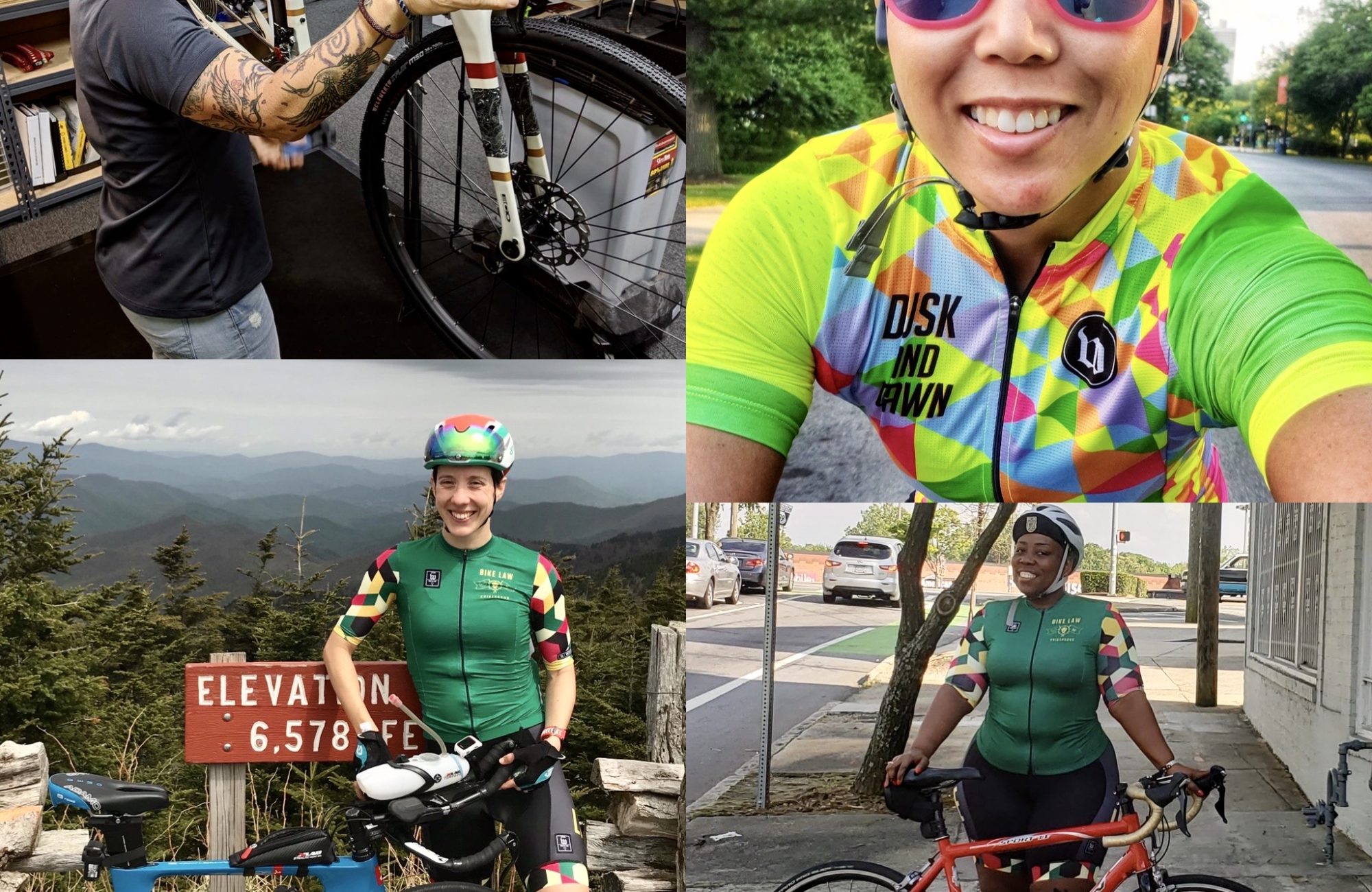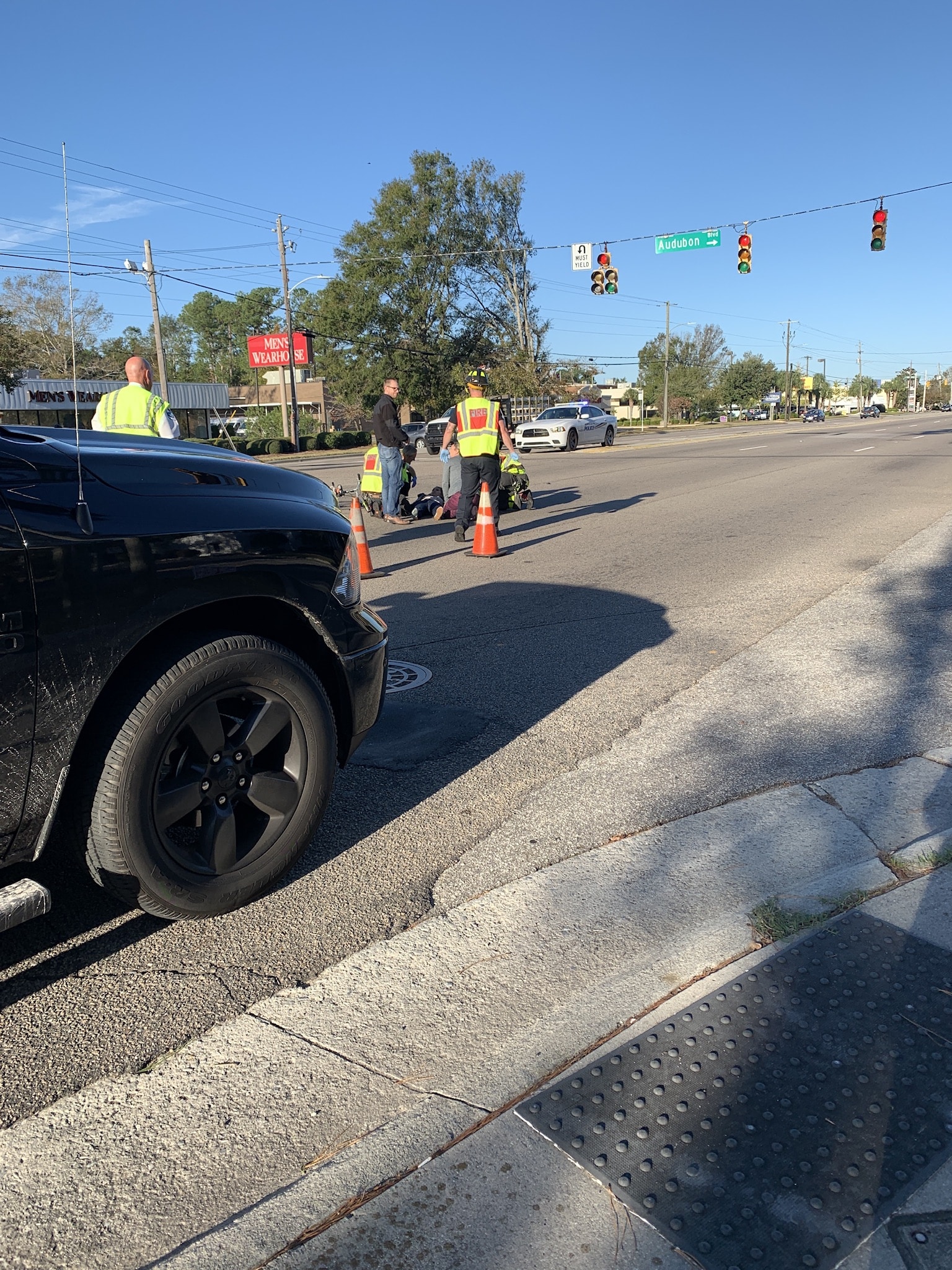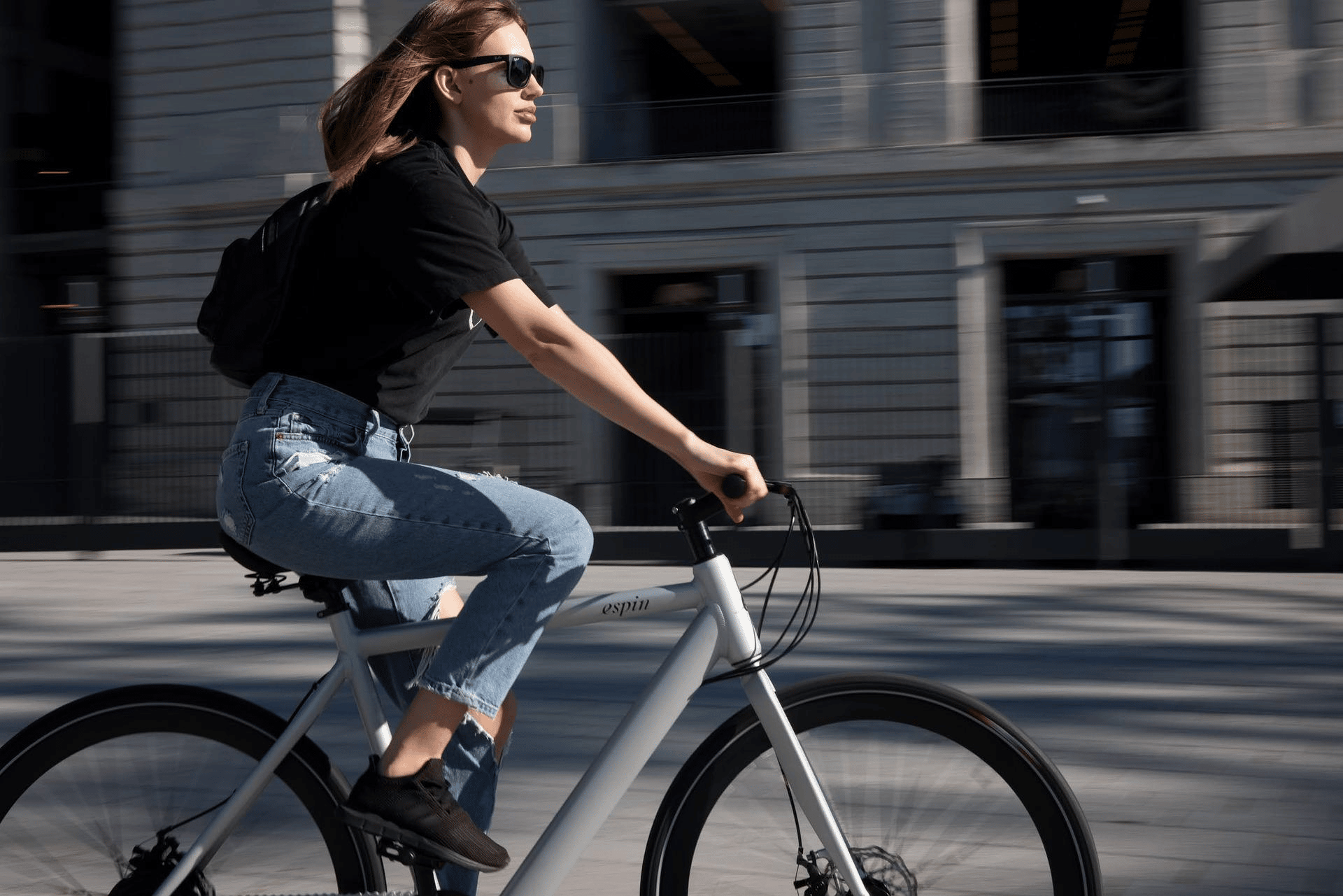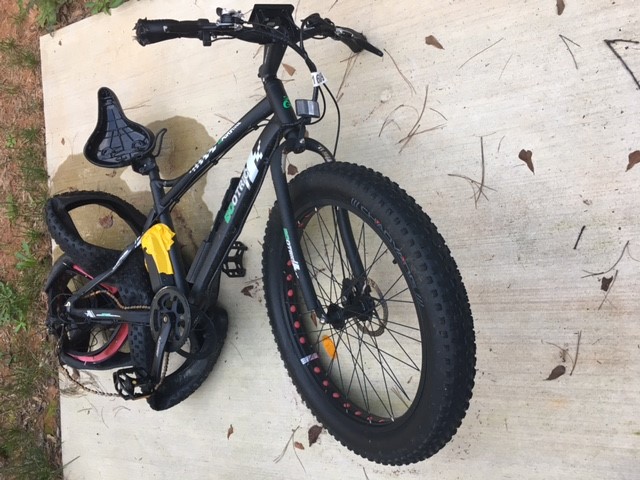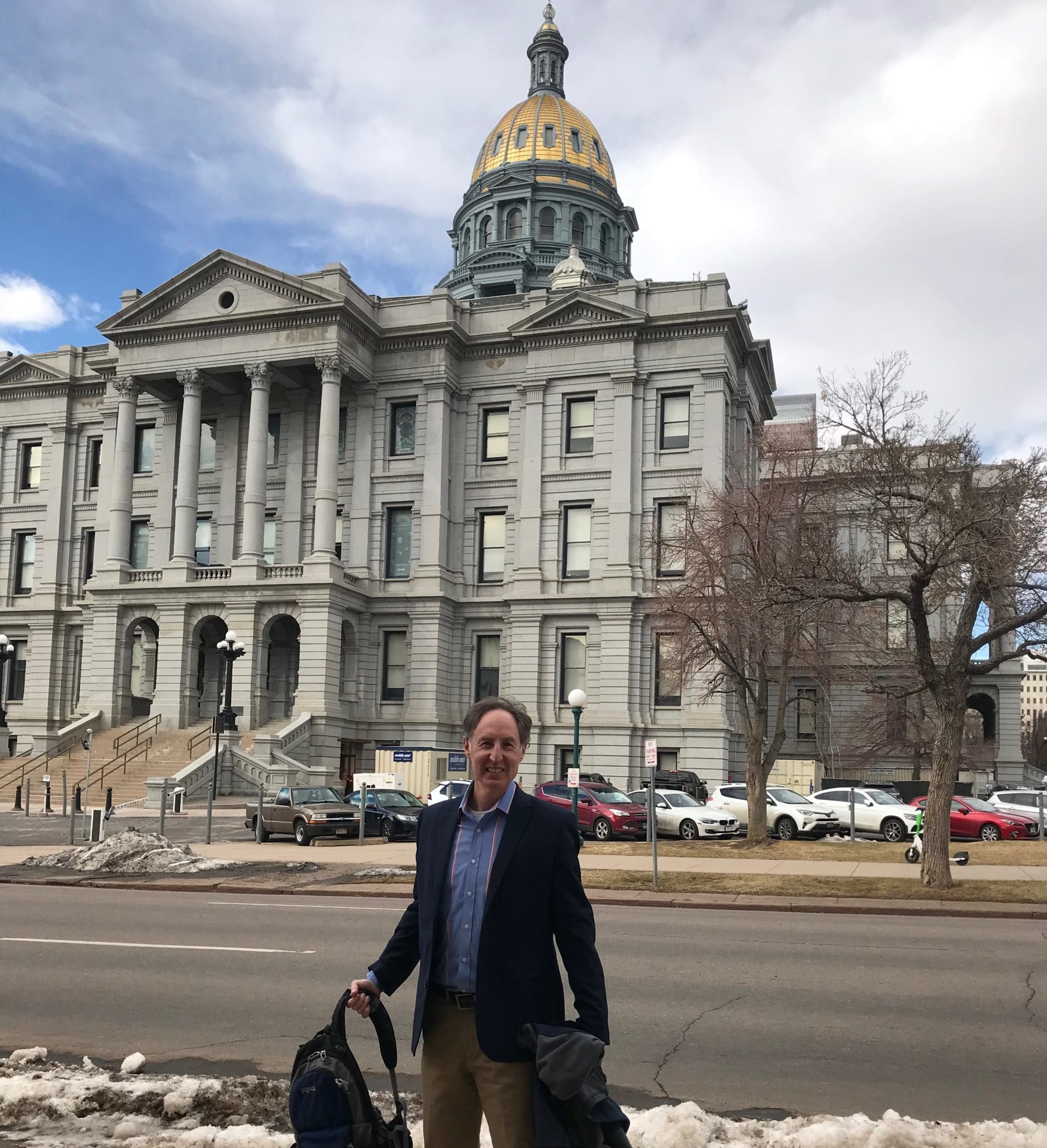Bike Law Ambassadors Julia Park-Charlton, Heather Anderson, Katrena Hunter, and Laura Specker-Sullivan are making biking better for women, and everyone else.
When I began compiling a list of Women on Bikes who’ve made invaluable positive contributions to our cycling community, I realized how lucky I am to be in the unique position of aspiring to, knowing, and riding and working closely with so many different SPOKESwomen. The women attorneys in the Bike Law Network and the dedicated founders of Women’s Cycling Day were obvious standouts because of their undeniable roles in shaping and securing the growth of safe cycling for all women who ride or want to begin.
If the very act of riding a bicycle requires balance, forward motion, and several working and moving parts, then the women who are most important to our mission and movement’s success are the ones in the saddle themselves.
Bike Law Ambassadors
Julia Park-Charlton, Heather Anderson, Katrena Hunter, and Laura Specker-Sullivan represent the Bike Law Foundation (our non-profit bicycle advocacy arm) as Bike Law Ambassadors, and are the diversity that defines our dynamic women’s cycling community with their active participation and contributions that grow female ridership in many different ways.
Women and Cycling
We’ve talked a lot about why we (women) struggle to start bicycling, but not enough about why once we do, it’s so damn hard to stop. Other than parenting, I can’t think of another facet of my life that doesn’t need to beg me for my commitment after falling, failing, crashing, and forcing me to face my own mortality with humility the way that biking does. And in many ways, they feel similar because while the sacrifices and struggles can sometimes be great in raising kids and riding a bike, the reward for doing both is ALWAYS greater.
For me, the reasons I choose the bike and choose it everyday are many. But health, fitness, catharsis, freedom, and fun play a secondary role in keeping me motivated and committed both personally and professionally. It’s the female friendships I’ve made and our love affairs with our bikes, and the ways these women lift me up and make me stronger and pull me along when I’m tired and weak that are most valuable and empowering. It’s their individual perspectives, experiences, skill sets, and unconditional appreciation for one another that make them a palpable answer to the million dollar question:
How do we make bicycling safer for all who ride?
The More People Ride, the Safer It Is
Ridership (the number of people on bikes) and Rideshare (the number of trips taken by bike) are inversely proportional to the number of crashes and fatalities suffered by bicyclists. The higher the first two numbers are, the lower the last number will be. Women between the ages of 17-28 are responsible for the largest growth in American bicycling in the last few decades. Add a viral pandemic, more “free time,” and nowhere to go to the mix and there’s no reasonable way to deny that we’re living in a Bike Boom that we can only hope will last forever.
But how do we make sure that the excitement and increase in ridership continues? We begin to fix the parts that are broken and we do it in a way that opens doors for more women- ALL women- to begin their own love affair with the bicycle in whatever way works and feels best for them.
It’s hard to convince someone, especially a woman, to try something new if their instinct is that it’s unsafe. It’s even harder to keep someone’s interest, especially a woman’s, in something that takes more than it gives when we have so many other obligations and responsibilities. (Even Beyonce only gets 24 hours in a day.)
As women, we are not only responsible for ourselves, but to some degree everyone else as well. Even if we don’t have them or don’t want them, there’s not a child alive whose existence didn’t require a woman’s contribution, no matter how big or small. So it makes tons of sense that the role women play in the growth of just about everything is significant and indispensable, even when undervalued.
Reasons Why Women are Often Afraid to Start Riding
What are the most common answers provided by women regarding why they are afraid of the bike? They’re mostly the same as their answers to why they are afraid to continue riding.
Here’s a peek into our thoughtful conversation.
Me: Why do you think women who don’t ride might be apprehensive or afraid to begin?
Julia Park-Charlton (Underwriter at Wells Fargo and IL Bike Law Ambassador)
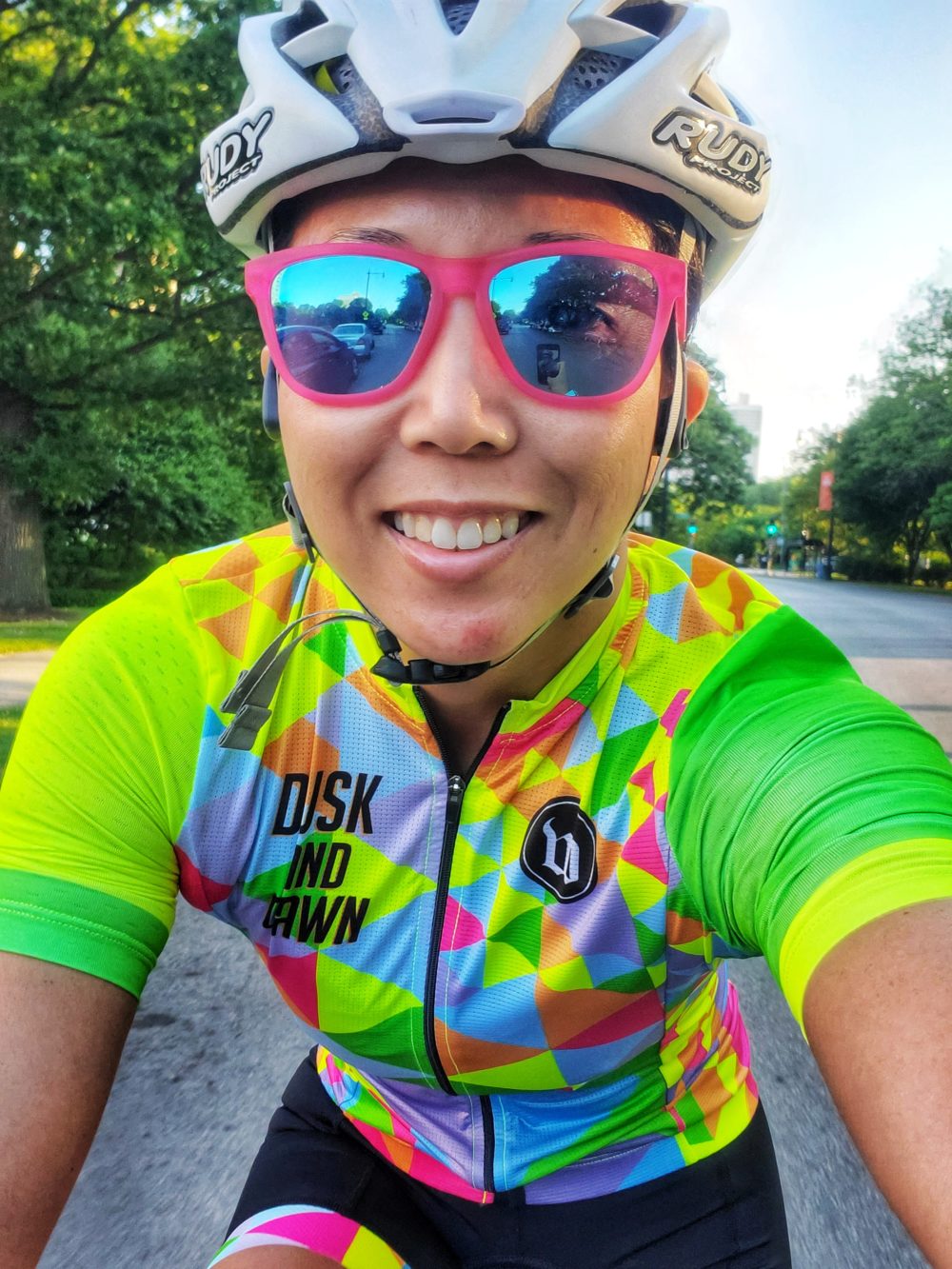
“I’ve been cat-called by men while riding. Women are somehow always objectified, and that’s sadly no different on a bike.”
Laura Specker-Sullivan (Professor at Fordham University, Professional Triathlete, PA Bike Law Ambassador)
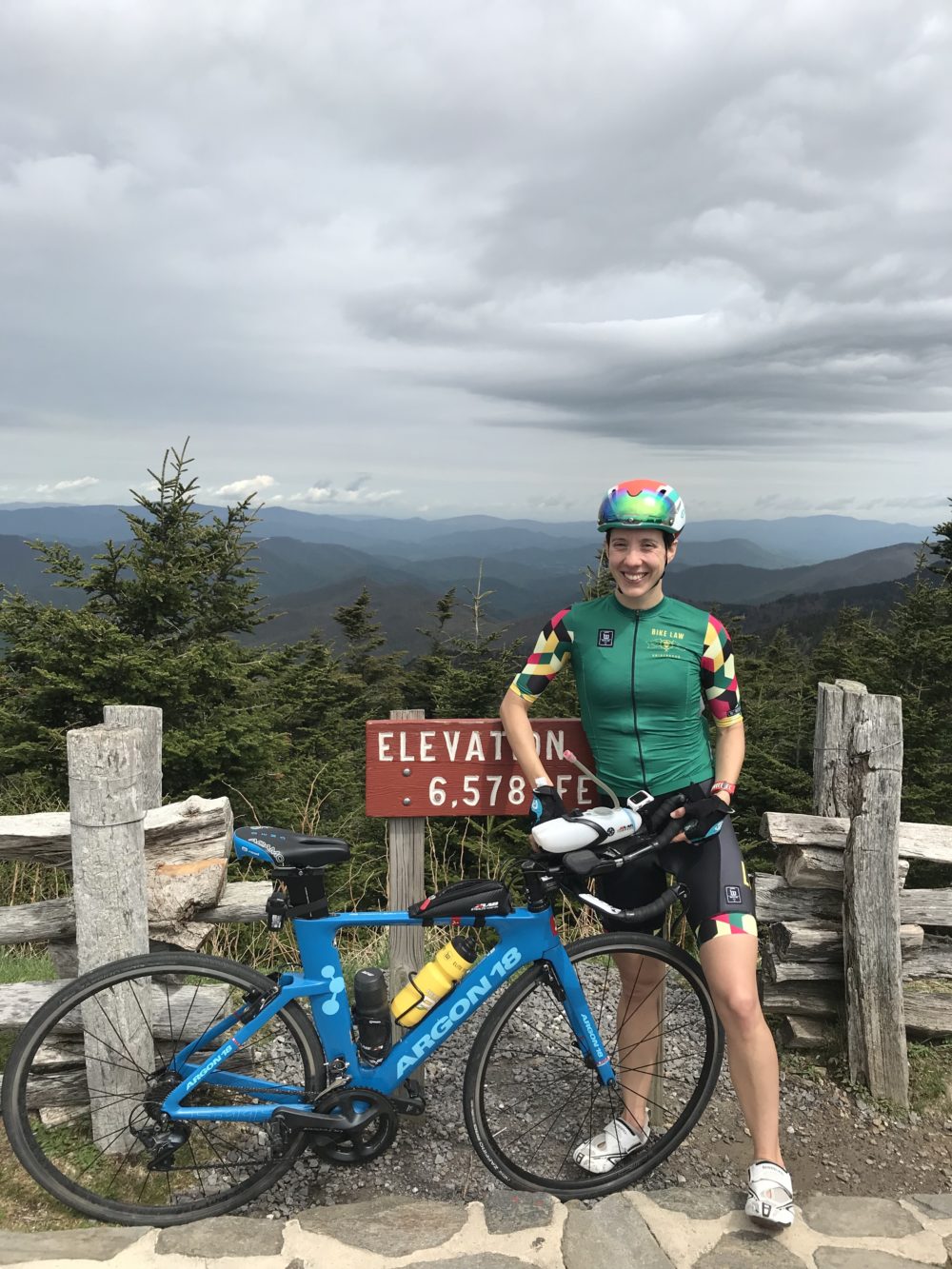
“I can’t speak for all women, but I know that for me, I was raised to be relatively risk averse. Even now when I go for a ride, my parents will tell me to “be careful” and “don’t get hurt.” I appreciate their caution, but growing up I didn’t see this same messaging directed at young boys who were trying out new sports, especially those with a little more risk like cycling. I’ve found that facing these risks intelligently and not being afraid of pushing a little outside your comfort zone leads to tremendous personal growth, and I hope that more women will find that as empowering as I have.”
Heather Anderson (Owner and Mechanic at Bikes Plus and FL Bike Law Ambassador)
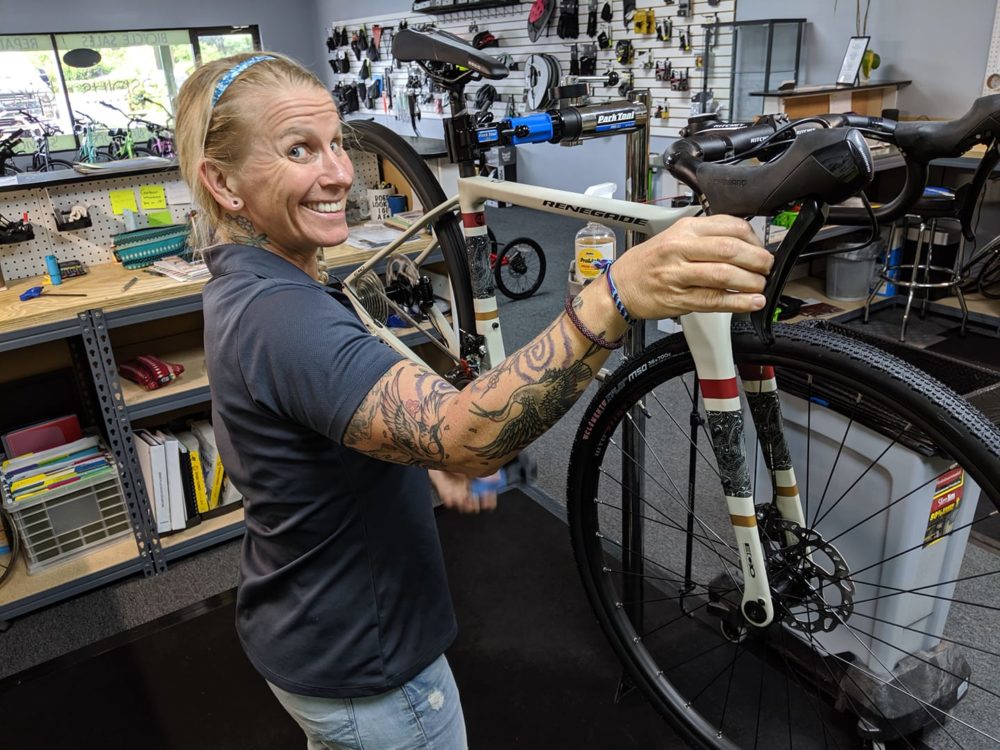
“Women have to work extra hard to “prove” their worth. Just going to a group ride or into a local bike shop can be super intimidating for most women. There can be a certain “boys club” attitude and vibe in these places.”
Me: All of this resonates with me. Keep going, please.
Katrena Hunter (Billing Specialist at Cox Automotive and GA Bike Law Ambassador)
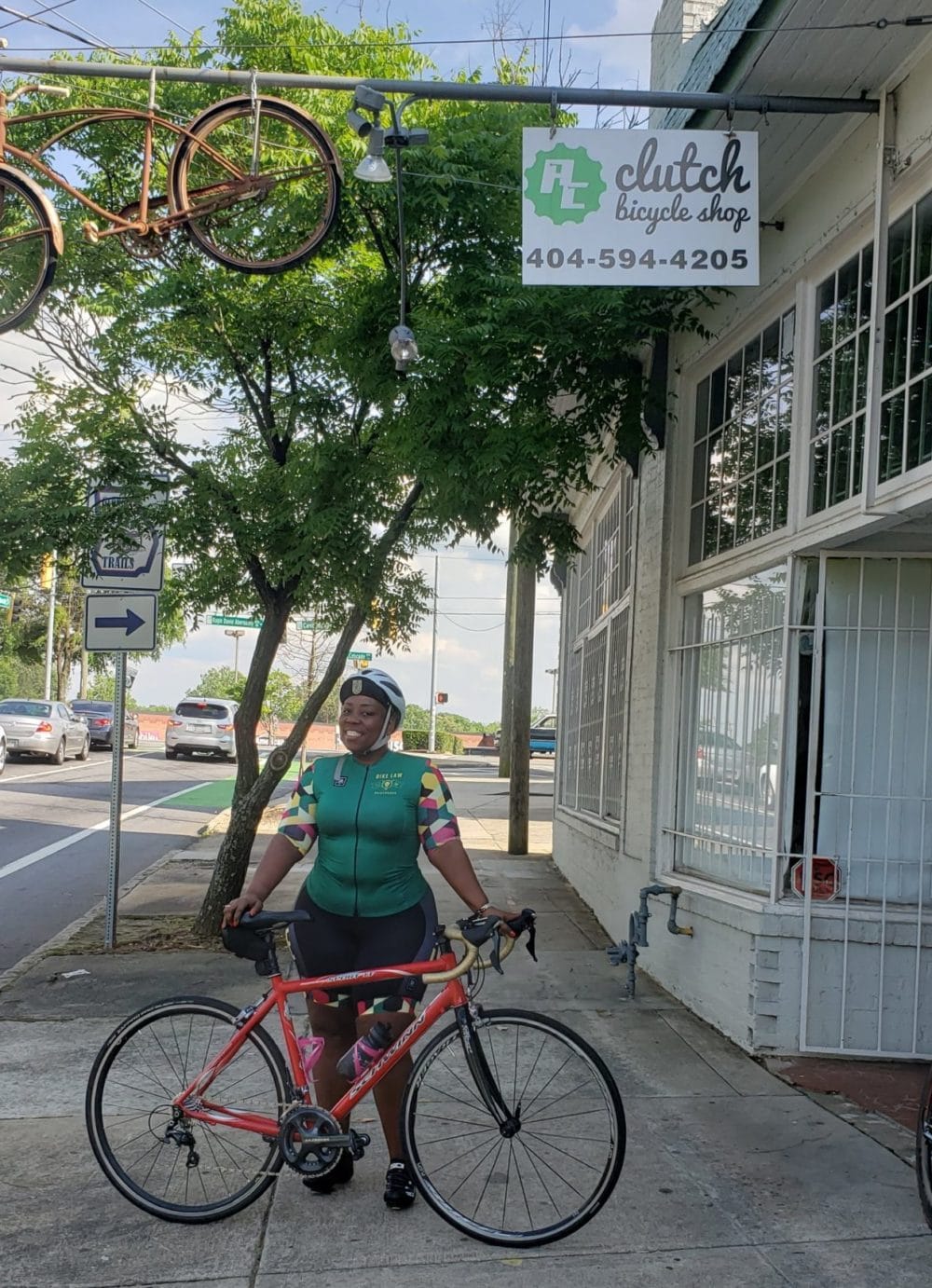
“Well I was once that woman – I felt I didn’t look like the other female cyclists or I wasn’t strong enough or fast enough.When I began cycling about 5 years ago I didn’t see many women on bikes. Not to say they weren’t out there, I just didn’t see them. As the years went on and my son Josh began racing I saw more women. Then I’d see them on the streets locally – in addition to women that looked like me. Now I see as many women as men out here cycling. Many who are avid cyclists who roll with some of the best and fastest cycling groups in the area.”
An Important Conversation Among SpokesWomen
Heather: “As a woman mechanic and bike shop owner, the worst thing about cycling to me is the daily struggle with sexist and misogynistic dudes who refuse to treat me and my fellow females in the sport and profession with any type of respect. In my community, I have teamed up with other badass women to organize women’s rides and clinics to help introduce new ladies to the sport in a non-judgmental and low pressure environment.”
Laura: “Unfortunately, I haven’t always had the best experience at bike shops. Most people have been nice, but there have been a few who felt the need to explain really basic things to me in simple terms. I’ve learned to mention my triathlon pro card, because that at least lets them know I’m experienced. I’ve also found that in races, male athletes will sometimes speed up to pass me and then slow down. It does help to race in the pro field and to start with a group of women. This isn’t unique to cycling – it happens in running, too.”
Julia: “I don’t think women are often taken seriously as men, when on a bike. We are often discounted for our abilities, simply because we’re not men. Just because we’re women doesn’t mean we’re slow, or only want to ride with other women, or can’t change a flat. While cycling is a male dominant sport, women have every right to participate as much as men. Availability of women specific bikes seems to be limited. I’m not opposed to unisex bikes, however expanding the availability of women specific bikes would help expand and encourage women to ride.”
Me: “I’ve experienced all of these things at some point in my life. And I agree that it doesn’t matter if we are in the saddle or not. Both personally and professionally, the imbalance in gender equity and mistreatment and disrespect by men are things that are so prevalent that they’ve become normative. And that is simply not ok. But I also know that these dynamics feel so bad because there are things to compare them to. There are lots of positives that we have to talk about because they are such a big part of what keeps us hooked, and what will tip the scale for all the other women who deserve the chance to experience the joy and importance of bicycling.”
Laura: “I’ve always ridden my bike to commute – I had an old steel Schwinn one summer in college when I interned in Chicago, a nicer aluminum Fuji in grad school in Hawaii, and now a really nice carbon Argon 18 triathlon bike for competition. It took me a little while to put together the pieces and do my first triathlon. I swam competitively in high school and ran for fitness after that. When I moved to Seattle in 2016 it turned out there was a large triathlon community that sucked me in, and I did my first race on my 1980s steel frame commuter bike with my pannier racks still attached. When I placed well after having passed much more seasoned men on carbon bikes with disc wheels, I realized I had more power in my legs than I had thought. As I’ve ridden more I’ve discovered an enormous sense of empowerment and confidence, not just in my own physical strength, but in my mental strength and my ability to move past fear and uncertainty.”
Trena: “I absolutely love my bike and the adventures I happen upon while riding. For me, the bicycle provided me an outlet and avenue to allow my voice to be heard on matters that are important to me and my family. The bicycle is the vehicle that literally guided me into the next chapter of my life. I have met so many people and have been afforded opportunities I otherwise would not have been a part of. I started out riding with my son – Josh. He went on to race so of course he got better and faster. By then I realized I really enjoyed riding my bike – in addition to the health benefits, mostly I enjoy the people I’ve met and relationships that have been formed.”
Me: “I know how lucky I am to have met all of you, but Trena, the first time Bruce (Bike Law GA) introduced us, it was after one of the worst experiences of your life, especially as a mother. Your son, Josh, whom you credit with getting you in the saddle, was hit while riding and suffered significant injuries. Today is actually the anniversary of our meeting. I will never forget it because you, Josh, and Bruce are such amazing people that I feel lucky to have in my life, and also because the bike Josh got that day is a real piece of art!”
It’s rare that we get the chance for an equal and immediate return on an investment. Cycling and friendship are two important parts of my life that give me instant gratification and provide a gut check and an honest reflection of what I’m doing and how well I’m doing it. It’s safe to say that I identify both (cycling and friendship) as life saving. And when they’re good, they ask very little of me that doesn’t come naturally. Both are always there for me when I need them and it doesn’t matter how long it’s been- it only matters that I’ve found my way back.
Julia: “I can remember from a very young age riding a big wheel bike, likely preschool age. Not too long after, my parents upgraded me to a big kid bike with training wheels. After moving to the city 6 years ago, riding was for enjoyment. I started doing triathlons in 2017 and rode more seriously for training, which eventually began to feel like a chore and decided to back off. Over the past year, the enjoyment has returned. Riding, especially in the early morning when the air is still cool, is quite exhilarating. It’s provided a nice escape during these lockdown COVID months while maintaining social distancing guidelines.”
Laura: “To be completely honest, I’m currently not riding much. Having just moved for a new job, I’m in a transition period and I’m figuring out how to balance priorities. I love riding, but I don’t know my immediate area very well, and it’s been hard to find routes with covid since there are fewer group rides happening. That being said, I’m exploring new ways to have a relationship with my bike – spending time in the woods has become incredibly valuable to me, so I’m thinking of getting into gravel riding. I’ve been camping more this summer and experiencing the same kind of empowerment I get from cycling. On the whole, I think biking is even more important – environmentally, economically, and politically. It’s a (relatively, compared with a car) inexpensive, accessible way to get around that contributes to individual health, has less impact on the environment, and is super, super fun. I think part of my personal reassessment of how and when I cycle reflects the experience of lots of people for whom getting started means surmounting some barriers, such as acquiring a bike in the first place, learning where it’s safe to ride, finding a trustworthy and welcoming mechanic, etc. It’s so rewarding to come out on the other side of that, but it’s also completely normal to be struggling with it.”
Trena: “Yes! And current events have impacted how I feel about riding, too. Although I feel riding is very important to my health and overall piece of mind, I haven’t been on the bike consistently in a few months. Not because I haven’t wanted to, however because of Covid I don’t feel it’s safe for me and the people around me. Since Covid, my mother has started dialysis – being an only child and her caregiver I had to take a break from riding- mainly group riding- which I love. I couldn’t risk bringing anything back to her especially now when she is most susceptible to all types of illness especially Covid!”
Heather: “COVID has changed the Bicycle industry in unprecedented ways. The first rush of new riders and returning riders was exciting, because more riders means more voices for positive changes in the community. However, that excitement quickly turned to frustration for those of us in the business. Our supply chain was seriously interrupted and sales of all things bike were non-stop. When we ran out of bikes, repairs began to surge and then we ran out of parts. Most things in our industry are manufactured in China, Taiwan or Hong Kong. With foreign trade, travel and companies scaling back workers for the pandemic, suddenly our industry was faced with redesigning our business plans & operating policies as well as sourcing parts from unconventional places/ways.”
Me: I’ve experienced the indirect symptoms of living through and with this viral pandemic both personally and professionally, too. The number of crashes and our caseload has skyrocketed. People are taking to the saddle and the streets in record numbers. But with an increase in ridership AND rideshare, we have a lot of work to do to catch all the other necessary elements of a better biking culture up to the number of people who are riding.
Heather: “Road riding in my area has become increasingly dangerous and un-enjoyable. We lack safe infrastructure for cyclists, poor public awareness and attitude towards cyclists, and a very large population of aging drivers coupled with some of the most aggressive driving in the country. As a result, much of our local cycling community has moved off-road to single track, fire roads, gravel paths and levees.”
Me: FLORIDA. I know this all too well. We have the largest number of crash fatalities in the country year after year. Sun-belt auto sprawl, separated land usage, poor enforcement of safe cycling laws, and distracted drivers are a real threat to all of the people who want to take advantage of the bike friendly weather we have down here, pretty much year round.
Julia: “I used to be terrified to ride in city streets and would resort to the Lakefront Path which is shared with runners and walkers, which is arguably as dangerous depending on time of day. COVID and the city mandated lockdown forced me to ride on the streets as the Lakefront was closed. With the decreased traffic during the lockdown, riding on the streets seemed less intimidating. There are many bike-friendly streets in Chicago which makes riding relatively safe. I quickly adapted to city riding and now prefer it to riding on the shared Lakefront Path.”
Laura: “I just moved here [outside of Philly] this summer and I’m still learning about the area. In general, the roads are really narrow and people drive pretty fast, but there are a number of nice bike paths and gravel trails. One of my goals is to live somewhere where I can ride out my front door, but I’m not quite there yet.”
Me: Amen. I’m less than a couple miles from some of the best cycling in central florida but unless I plan to ride at very specific times of the day, I have to drive to begin my ride because I am afraid of the drivers who might kill me while I’m on my bike.
Heather: “I am rarely afraid to ride. A more accurate feeling for me would be anxiousness when riding in or near traffic. Sometimes, though, the thrill of taking calculated and controlled risks riding single track and being “good scared” is what keeps me coming back.”
Trena: “I live in downtown Atlanta. It’s getting better here. Although most (a few) streets in the city have bike lanes or signage that warn or remind the motorist to share the road – I feel the city did not do their due diligence in educating motorists on the laws pertaining to properly and effectively sharing the road with cyclists.”
Julia: “Chicago drivers are aggressive and that has always made me hesitant to ride in the city during certain times of day and along certain streets downtown. I’ve also been doored. That hasn’t stopped me from riding, you simply become more aware of your surroundings and ride defensively with traffic.”
Me: What can we do to assuage these fears and concerns?
We certainly can’t give up!
Julia: “Ride with others or during less congested times or days. Ride bike-friendly streets with bike lanes or protected bike lanes. Be aware of your surroundings.”
Trena: “Educate motorists and cyclists on the laws and rights of both as they pertain to each other. Basically teach everyone how to Share the Road.”
Heather: “In my area/community I feel better public and driver education, more bike paths or multi-use paths – at the very least, segregated bike lanes would help with those fears. The attitude of some folks towards cyclists of any kind is really sad. In addition, some cyclists don’t really know or follow the laws either. This makes it harder to get drivers to see cyclists as vulnerable rather than an annoyance.”
Me: We absolutely have a duty to lead by example. The same way we take our responsibilities at work and at home seriously, the examples we set for other cyclists and the way we encourage and teach new ones to join our community is of the utmost importance. We have the unbridled ability to shape bike culture in a safe and scalable way. US! Women riders from all walks of life who live in different places, who look nothing alike- ok, maybe Jules and I could pass for sisters- and have day to day lives that are as diverse as can be!
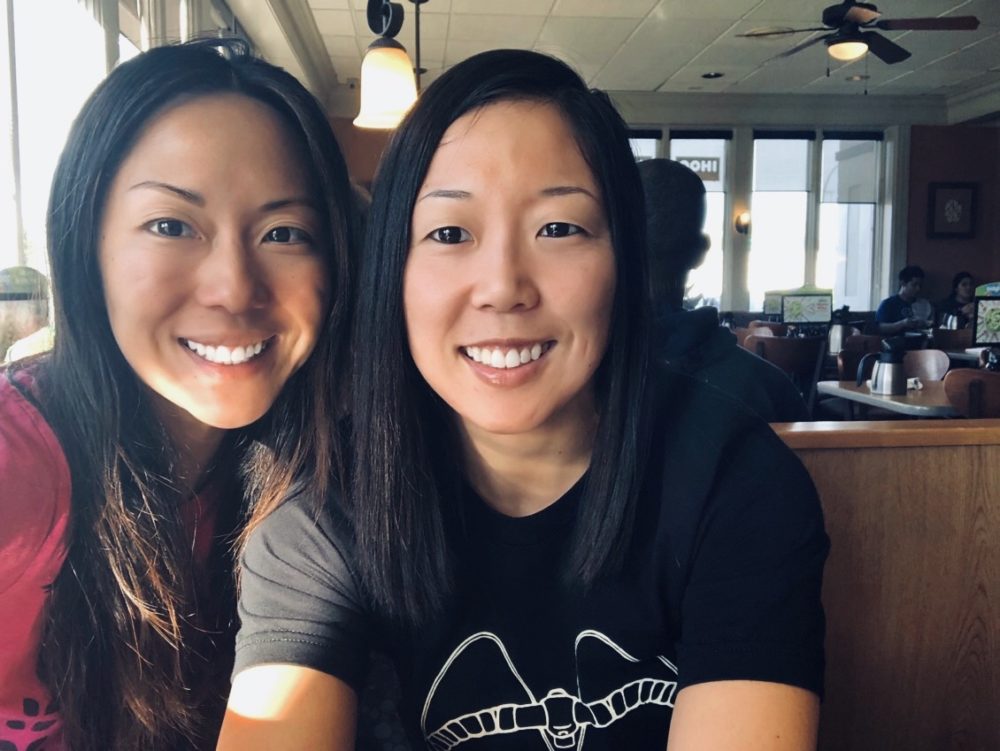
Everything we do in life is under a microscope anyway. Why not do everything we can to grow biking into the biggest, best possible version it can be, right?! We see things differently as women, but getting out there and inviting a girlfriend to come with us is an easy way to start solving some of these problems.
Trena: “I feel women cyclists provide a fresh perspective to what was once a male dominated sport/past time. I believe I read a study that stated that women were more concerned with protective bike lanes and viewed that as an urgent priority. I feel that women cyclists may also be more inclined to advocate for protected bike lanes with consistent and clear signage to encourage female riders. These types infrastructure advocacy would make cycling safer for everyone – especially other women. Women also provide ‘more representation’ – seeing more women who ‘resemble me’ would definitely grow the cycling community. We would also emphasize women’s safety in public spaces.”
“I am blessed to live in a city where the Cycling Culture has progressed tremendously, especially Women’s Cycling. I am grateful to be a part of that culture as a cyclist and a ride leader for L.I.P.S. (Ladies Into Pedaling Successfully) West Side. This group was created to help women ride with confidence with other women who share a common interest. To also help educate and teach simple bike riding skills, laws and techniques in a safe environment. Preparing them for other group or solo rides. Mostly though, I’ve always believed – People do what they perceive to be possible – therefore if any woman sees me – a FULL FIGURED, CURVY BLACK WOMAN on one of those ‘lil bikes’ with ‘lil tires’, YOU can ride too!!! People like me/us do cycle! Representation definitely matters – no matter how you Identify!!! Because Women on Bikes are the future of the cycling movement.”
Laura: “Again, I can only speak for myself as a woman in cycling, but I think the major challenges here are cultural. For many people, cycling is best known by events like the Tour de France, which is restricted to men. It’s hard to feel that cycling is something you can do when the icons in the sport are all male. Women may also feel unequal pressure to conform to beauty standards that make it difficult to show up at work sweaty and with hair that’s been in a helmet all morning, or to find solutions that let you bike to work and feel like you look professional. And then when the bike shop employees always assume you don’t know anything about your bike, it can really start to feel like this isn’t a place for you.”
“The more women we see in cycling, the more normal it will be for young girls to take on the sport and to have role models to look up to. I was recently watching the British television show Agatha Raisin, and one of my favorite aspects of the main character is that she’s repeatedly shown riding her bike around the countryside. The fact that this was such a welcome surprise to me shows how unusual it is to see media representation of women cycling.”
Julia: “Yes. Ride! As simple as it sounds, asserting presence on a bike in your community is such an easy and passive way to encourage others to ride.”
Heather: “The solution is more women in influential and leadership positions in the cycling industry. When it is more “normal” to see women in these places, I feel the industry & community as a whole will be more accepting and inclusive. This quote by RBG sums it up for me…. “Women belong in all places where decisions are being made”. Likewise, women belong in all places where you can pedal a bike.”
“Women Belong in All Places Where Decisions are Being Made”
When I found myself with a list much longer than I expected of female cyclists who take their roles as SPOKESwomen, ambassadors, and friends as seriously as they do, I realized how special these four women are and how much they stand out in a sea of incredible female riders. They might not be the fastest. They may never ride to race and may never race to win. They might take a break from the saddle when their responsibilities in other parts of their lives need more attention and time. But what sets them apart as notable Women on Bikes are the metrics that matter most in ALL areas of life: these four women rise (and ride) to the occasion with humility, compassion, humor, brilliance, and love.
These women are Bike Law Ambassadors. The women ARE Bike Law.
They’re the fibers of our community that hold us all together and create safe, welcoming spaces for other women to join us. They are living, breathing invitations to a better, safer, more inclusive, and celebrated bicycling culture that can take over and save the world.
One pedal stroke at a time.

Rachael Maney is the Director of the Bike Law Network and of the non-profit Bike Law Foundation.



